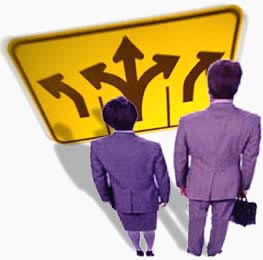|
Business Decision Making ProcessHow Dangerous Is Common Sense?
There are many factors that lead to good decision making and in overview they include these elements:
Recommended resourcesAs a very practical resource and reference with comprehensive free downloads and templates I recommend this excellent site which clearly explains decision making in non-technical language and show you how to improve your decision making skills and techniques: Decision Making - The Best & Most Practical Guide Available The rest of this page contains a cross-section of surveys and reports by some of leading business intelligence sources. Full PDF downloads are available on the links shown below.
How dangerous is common sense in the business decision making process?In "Everything is Obvious, Once You Know the Answer: How Common Sense Fails Us", sociologist Duncan Watts' suggests that in complex situations when it comes to making decisions based on our assessment of future outcomes, we can get it badly wrong if we rely solely on common-sense. He suggests that because common-sense is largely based on (a) accumulated evidence drawn from past experience, and (b) the assumption that history repeats itself - we fail to understand that in times of great change - such as we are experiencing now, complex phenomena are based on events that never repeat themselves and can't be examined scientifically. "Once we know the outcome of a situation, we rationalize the reasons why it occurred and convince ourselves that we've learned something from it that we can use in making future decisions. As a result, we give unwarranted credit to such things as experience, intuition, and even common sense." How Dangerous Is Common Sense to Managers? - Does Common Sense Impede Change?
In search of clarity in the business decision making processIn Sept 2007 the Economist Intelligence Unit published a survey conducted of 154 global C-suite executives. The high level results make frightening reading. Would you believe that more than 90% of these executives state that they are making decisions of considerable importance on the basis of inadequate information? Over 50% fear that missing information may be causing them to make poor decisions. Approximately 25% feel that their management often if not always make the wrong decisions. "Decision-making is at the core of all business activity, as executives set strategy and manage operations by weighing a vast array of factors to arrive at the desired balance of risk and reward. It is cause for alarm, then, that executives themselves perceive the quality of decision-making at their companies as mixed at best." In search of clarity - Unravelling the complexities of executive decision-making
The intelligent enterprise and the business decision making processIn Dec 2009 the Economist Intelligence Unit published a survey conducted of 200 senior executives from North America, Western Europe and Asia-Pacific across a wide range of industries and company sizes. A summary of key findings indicates:
Strategic flaws in the business decision making processIn November 2008, Consulting group McKinseys conducted a global survey of over 2000 corporate executives on how their decision making processes impacted outcomes. "Irrational thinking doesn’t just affect individual economic decisions; it affects corporate strategic planning as well. These results highlight the practices of companies that have made successful strategic decisions—and also reveal what the same companies have gotten wrong." Elements of good decision making processes include:
Common mistakes in the decision making process include:
McKinsey Global Survey on Strategic Decision Making - "Flaws in strategic decision making"
Additional surveys and reports
Global Survey: The Business Impact of Big Data Leaders Fail to Set a Clear Vision, Recognize and Reward Innovation Return from "Business Decision making Process" to: "Starting the change management process"
|


 The business decision making process is getting harder and more complex in the current economic climate.
The business decision making process is getting harder and more complex in the current economic climate.


